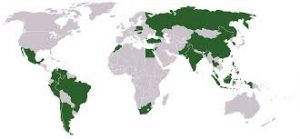 If you’re taking client money off the table in U.S. equities, put them in emerging markets, says Rick Friedman, part of the asset allocation team at GMO, a mutual fund company. It’s a matter of price, really. MSCI Emerging Markets return on equity is trading at a 13% discount compared to MSCI Developed Markets ROE. Price-to-earnings is 30% less in emerging markets than in the core economies.
If you’re taking client money off the table in U.S. equities, put them in emerging markets, says Rick Friedman, part of the asset allocation team at GMO, a mutual fund company. It’s a matter of price, really. MSCI Emerging Markets return on equity is trading at a 13% discount compared to MSCI Developed Markets ROE. Price-to-earnings is 30% less in emerging markets than in the core economies.
Last year was the year to get into many emerging markets. Political crises and weak oil gave these countries flea market prices. In emerging markets, you make money when things go from truly awful to merely bad; and then when they go from good to great.
“One camp of investors sees only bad news ahead as a result of Trump’s victory. For these bears, the double whammy of stimulative U.S. fiscal policies coupled with possible protectionist barriers, makes emerging investments less attractive,” writes Friedman. He warns that, “the potential for a stronger U.S. economy will lead to higher inflation, interest rate increases, and a strong dollar: a brew that will be bad for countries (and companies) carrying high dollar-denominated debt and running current account deficits.”
This is probably true for smaller emerging markets. The big ones can finance themselves domestically for the most part or, countries like Brazil are large enough and have enough reserves at their central bank to entice foreign investors to buy their new bond issues. Brazil did this just last week, and the market didn’t bat an eye for this junk bond.
Friedman is more focused on equities. And he is not too scared about the Trump effect on countries like China and Mexico. “Our horizon extends out for decades, not the length of any single administration,” he says.
The question all investors should be asking is not, “Is it risky?” but rather, “How is that risk being priced?” Some emerging equities are still quite rich. Mexican equities for example. Same with India. Even Brazil was expensive a few weeks back. But compared to the U.S., many of the multinational players here and the large cap domestic names with ADRs, are household names in their respective countries as well as known entities here in the states. A passive approach in the ETFs will end up capturing all the expensive large caps. Advisors who like to pick a few winners themselves, and are value minded, will have to do some digging.
A random walk at three names that are cheap: Brazil beverage giant Ambev (ABEV 2,42 -0,06 -2,42%) is trading at less than 7 times. The stock is up 9.4% this year and has a 3.11% dividend yield in dollars. Bancolombia (BAC 33,18 +0,14 +0,42%) trades at 9.6 times, is down 0.85% this year and pays a 3.23% dividend yield. It’s probably one of the cheaper stocks in the country and it has outperformed the MSCI Colombia index. China Mobile (CHL 27,51 0,00 0,00%) is trading just about in line with the index, at 14 times earnings and is up 4.4% this year, with a 3.16% yield.

